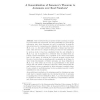Free Online Productivity Tools
i2Speak
i2Symbol
i2OCR
iTex2Img
iWeb2Print
iWeb2Shot
i2Type
iPdf2Split
iPdf2Merge
i2Bopomofo
i2Arabic
i2Style
i2Image
i2PDF
iLatex2Rtf
Sci2ools
CADE
2009
Springer
2009
Springer
A Generalization of Semenov's Theorem to Automata over Real Numbers
Abstract This work studies the properties of finite automata recognizing vectors with real components, encoded positionally in a given integer numeration base. Such automata are used, in particular, as symbolic data structures for representing sets definable in the first-order theory R, Z, +, , i.e., the mixed additive arithmetic of integer and real variables. They also lead to a simple decision procedure for this arithmetic. In previous work, it has been established that the sets definable in R, Z, +, can be handled by a restricted form of infinite-word automata, weak deterministic ones, regardless of the chosen numeration base. In this paper, we address the reciprocal property, proving that the sets of vectors that are simultaneously recognizable in all bases, by either weak deterministic or Muller automata, are those definable in R, Z, +, . This result can be seen as a generalization to the mixed integer and real domain of Semenov's theorem, which characterizes the sets of i...
Automata Recognizing Sets | Automata Recognizing Vectors | Automated Reasoning | CADE 2009 | Integer Vectors |
| Added | 23 Nov 2009 |
| Updated | 23 Nov 2009 |
| Type | Conference |
| Year | 2009 |
| Where | CADE |
| Authors | Bernard Boigelot, Jérôme Leroux, Julien Brusten |
Comments (0)

